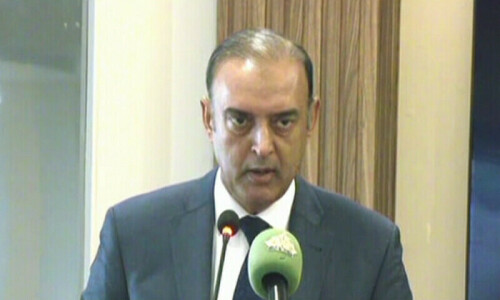ON Monday, the BBC Panorama programme substantiated an extraordinary allegation that suggested how far the war on terror has descended into legal abyss. The claim was that MI6, the UK Secret Intelligence Service, rolled the pitch for Tony Blair’s bizarre 2004 hug-in with Libya’s Colonel Qadhafi by apparently arranging for the CIA to kidnap latter’s opponent in exile, Abdel Hakim Belhaj.
He was seized in Bangkok, where he and his wife were en route to Britain. It’s been suggested they were ‘rendered’ via the British colony of Diego Garcia to Tajoura jail in Tripoli. Belhaj spent six years, and his wife four and a half months, at the tender mercies of Qadhafi’s security boss, Moussa Koussa. Belhaj’s pregnant wife was taped like a mummy on a stretcher, and he was systematically tortured. Koussa himself denies any involvement in torture.
With this gift came a covering letter from MI6’s Mark Allen, offering Koussa congratulations on the “safe arrival” of the “air cargo [Belhaj]. This was the least we could do for you and for Libya to demonstrate the remarkable relationship we have built over the years”.
Within two weeks Qadhafi was welcoming a fawning Blair in his famous desert tent, and announcing that he would abjure terrorism and set aside his ‘planned’ weapons of mass destruction. The plans were spurious, but the deal allowed Blair to walk tall in Washington at a time when the Iraq invasion was turning sour.
Less spurious were other elements in the strange relationship. It was claimed Britain would not just deliver Belhaj but lift sanctions. Qadhafi would greet BP’s Lord Browne, accompanied by Allen, who switched with full ministerial approval from being an MI6 officer to a £200,000 special adviser to BP.
When, three years later, the £15bn deal with BP seemed to falter, it’s claimed Allen pressed his old boss, Jack Straw, the former home affairs and justice minister, to release Libya’s Lockerbie bomber, Abdelbaset al-Megrahi. Allen was a senior adviser to Monitor consultancy, which helped boost Qadhafi’s world image, and assisted the London School of Economics (LSE), on whose advisory board Allen sat and where Qadhafi’s son Saif was receiving a much-heralded PhD. The new chairman of BP was none other than Sir Peter Sutherland, also chairman of the LSE.
When, in 2011, Qadhafi’s regime was visibly tottering, Britain coolly deserted him. Sanctions were reimposed, but no one thought to tell Nato special forces, present at the fall of Tripoli, to find and secure the building in which the incriminating documents lay. Presumably to the horror of MI6, Human Rights Watch got there first and found Allen’s letter, which was handed to journalists. To make things worse, Belhaj was now out of jail and head of Tripoli’s military council. Worse still, his old nemesis, Koussa, had shrewdly defected as Qadhafi crumbled and was able to confirm Belhaj’s suspicions of British complicity in his fate.
Belhaj is not a man to hide a grievance and is now suing Allen and the British government for “complicity in torture” and “misfeasance in public office”. He has reportedly been offered and refused £1m from the British government to shut up. It is a tale of panic and cock-up. —The Guardian, London











































Dear visitor, the comments section is undergoing an overhaul and will return soon.